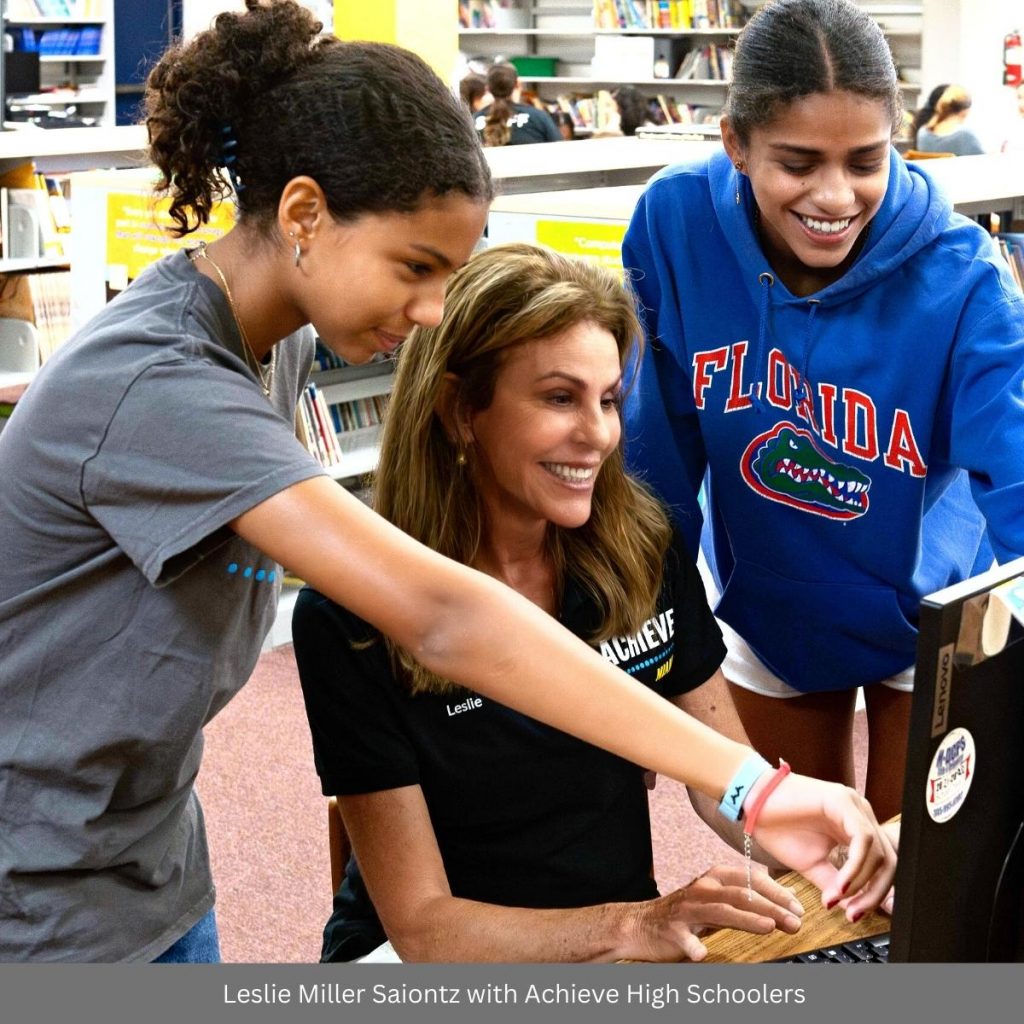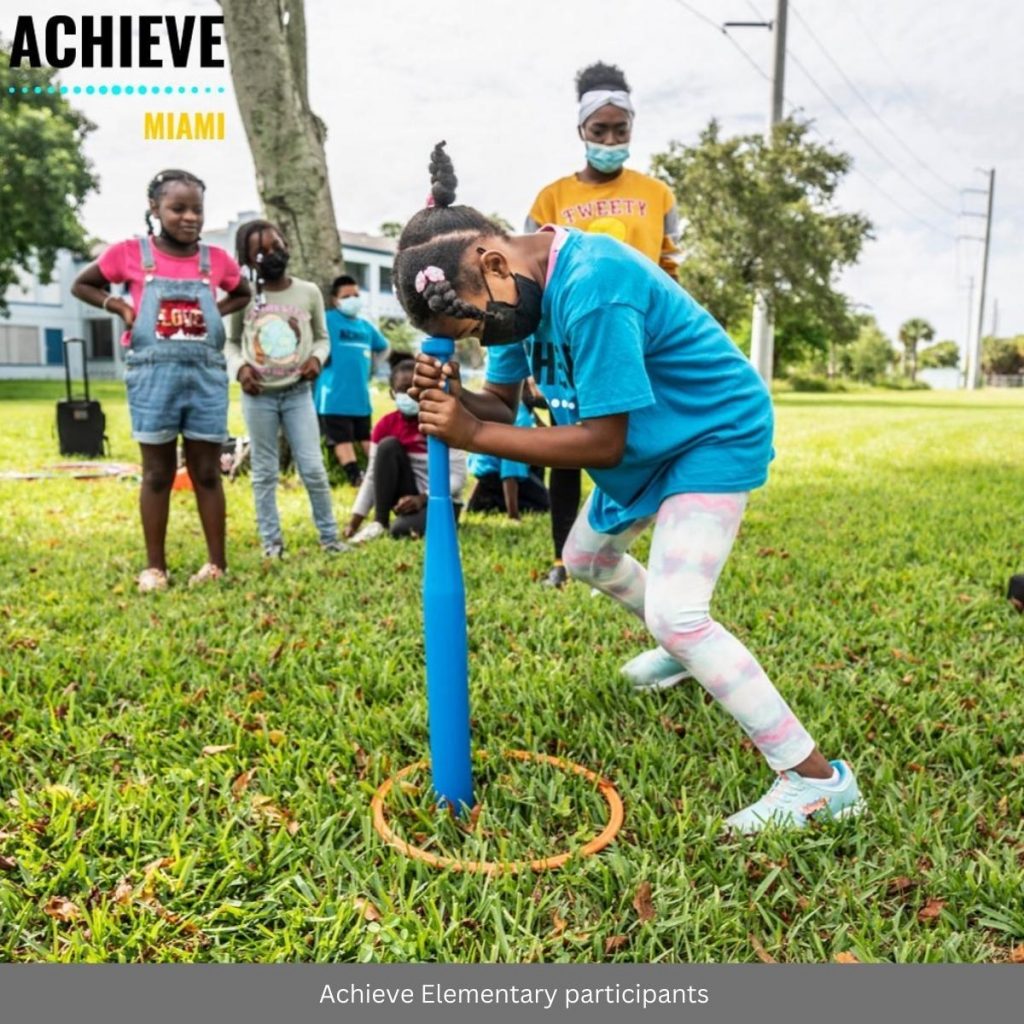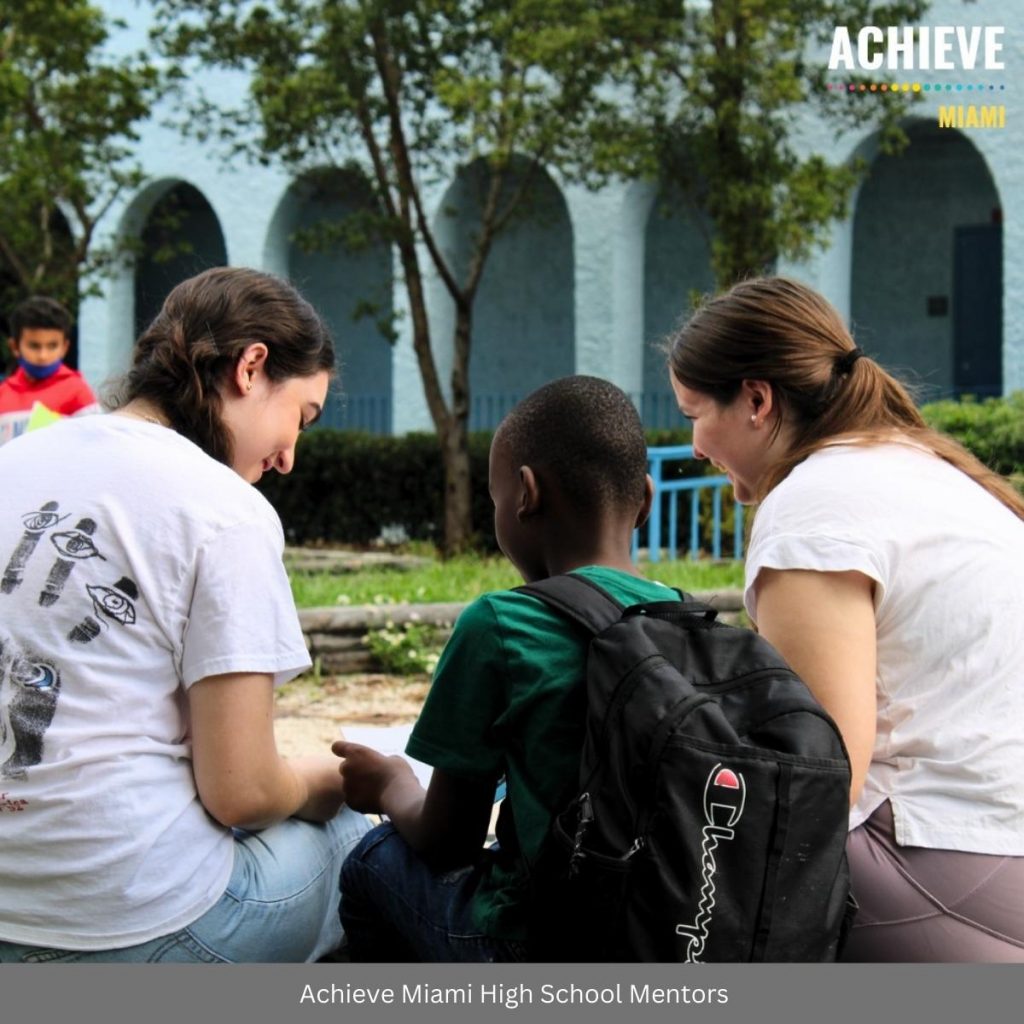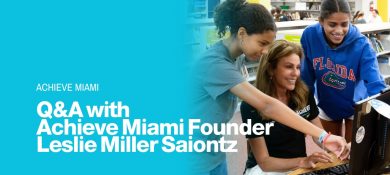
When Leslie Miller Saiontz saw the learning disparities in Miami schools up close, she was inspired to bring together the public and private sectors to unlock tangible solutions for challenges in education.
The nonprofit she founded in 2015, Achieve Miami, is now leveling the playing field in underserved Miami-Dade schools. In just eight years, Achieve Miami has grown from serving 30 students to supporting over 2,000 students at 17 locations across Miami.
From addressing the chronic teacher shortage, to enriching students’ lives through music education, and equipping students with high-speed internet, Achieve Miami is on the front lines bridging gaps in our local schools.
SMS’ Aaron Gordon connected with Leslie to discuss the state of affairs in Miami schools, how population growth is impacting the education landscape, and what’s next for Achieve Miami.
Aaron: Leslie, I’d like to begin our conversation talking about the big picture. Education in South Florida, and specifically K-12 education, has been a timely topic in the news lately, and it’s one that you’ve really championed going back several years now. Can you give us the lay of the land, and explain what drew you to the education arena?
Leslie: As the mother of six children who are the product of Miami schools, I have seen first-hand how education plays a critical role in the development and trajectory of children. There’s no cause or sector that impacts every family and every community the way education does, but the reality is that too many of our South Florida students and schools are operating on an uneven playing field.
My first experience in the classroom came about 20 years ago, when a close family friend of mine asked me to volunteer in her Kindergarten classroom in Overtown. That day was lifechanging for me. I saw a classroom full of loving, caring, eager, talented children who were suffering from huge disparities relative to children at other schools across our community.

I left inspired to do something, so I began volunteering weekly at the school. My time there opened my eyes to a lack of resources, teacher shortages, and different set of expectations for children in underserved schools.
Soon after, I joined the board of Teach for America in Miami and in 2015, we founded Achieve Miami with the goal of bringing together the public and private sectors to unlock tangible solutions for challenges in our education system.
Achieve Miami puts ideas into action, with the mindset that education is the basis for a thriving and sustainable community. If Miami lacks a strong educational backbone, then it will be impossible to overcome long-term challenges like affordability, homelessness, climate resiliency, and mobility.
Aaron: Leslie, when you say Achieve Miami puts ideas into action, can you offer some examples of the programs you’ve put into place and how they’re helping students in our public schools?
Leslie: Absolutely, we have programs in place across Miami and throughout the year. Where do I begin?
Right now, our Achieve Summer program is up and running at four schools with hundreds of students enrolled. Achieve Summer fills the gap when school is out and helps prevent the dreaded ‘summer slide,’ which can be especially prevalent among students in lower-income neighborhoods.
Each summer, we employ a team of teachers who lead a project-based curriculum emphasizing leadership, teamwork, and music. Their work is complemented by high school students who commit their summer to volunteering and mentoring our program participants.
Throughout the school year, we operate several peer-driven initiatives that deliver a similar impact. Our core programs include Achieve Elementary and Achieve Saturdays, which support elementary students in their literacy and music development through after school and weekend programming.
Achieve High School brings together diverse students from across Miami who connect and collaborate while serving as mentors for underserved elementary students. That program equips high schoolers with community service, leadership skills, and college readiness. Additionally, our Achieve Scholars program provides comprehensive support to deserving high school students, offering meaningful college and career readiness, financial and digital literacy, and intensive mentoring – ensuring they are well-prepared to succeed after graduation.
Our programs work because it’s proven that children in lower-income communities are incredibly motivated by their older peers. When a third grader watches a high school senior excel in school, pursue graduation, and apply for college, then that becomes their reference point, and they are more likely to follow a similar path.

Here’s one of my favorite data points: While the average college attendance rate among students at underserved high schools in Miami is between 15 and 20 percent, approximately 90 percent of our Achieve students go on to college or postsecondary institutions.
Aaron: Leslie, I’m curious how the teacher shortage factors into this equation. How are empty classrooms taking a toll on students, and what solutions exist for growing our teacher population?
Leslie: The chronic teacher shortage has become a national challenge. On the first day of school for the 2022-23 school year, there were 5,000+ vacant teaching positions in Florida, including 300 in Miami-Dade. That number could double this fall when school starts.
The teacher shortage is impacting everyone who has school-aged children, as well as businesses whose employees have kids. No school or community is immune. The shortage factors heavily into our future because our ability to attract talent and businesses hinges on the health of our public education system. If we can’t fill our classrooms with qualified teachers, then we won’t be competitive as a community.
Recognizing that the fastest path to solving this crisis is expanding our pipeline of teachers, Achieve Miami teamed up with Teach For America and the University of Miami to launch the Teacher Accelerator Program, TAP, in 2022.
TAP equips college seniors who have qualified skill sets and varying interests, and prepares them to enter a classroom as a certified teacher. We begin with a one-semester course, followed by a paid internship, and then guaranteed placement in a local classroom. This coming fall, we expect to place 50 teachers in Miami-Dade classrooms.
We’re just getting started. Our team is already in talks with other universities about expanding the program, both nationally and locally, beginning with Miami-Dade College.
TAP is a great example of how Achieve Miami is harnessing the power and resources of the private sector to address challenges in our public schools.
Aaron: Leslie, I’m glad you referenced the private sector, because one of the key ingredients in Achieve Miami’s success has been the fact that you’re privately funded. I’d like to wrap up by discussing how you motivate companies and individuals to get involved, and what business leaders can do to become engaged.
Leslie: I’ve long said that it’s incumbent on everyone to pay attention and bring about change. Achieve Miami has become a fantastic vehicle for doing exactly that.
Making our schools more equitable, developing local talent, and ensuring we have a robust workforce of educators is a community-wide effort that requires support from the private sector. Our public schools are competing for dollars, competing for teachers, and in many cases, competing with private and charter schools. That’s a daunting task, and private donors and organizations are well positioned to help.

Achieve Miami is thriving because we’re effective at identifying shortcomings in the system, devising tangible solutions, bringing together multiple partners working toward a common goal, and securing the funds needed to implement.
Donors and corporations appreciate the way we work, how we deploy funds, and the results we deliver.
One of the best examples is Miami Connected. At the onset of the pandemic, we partnered with the Miami Foundation, Miami-Dade County Public Schools, and a long list of private sector partners to provide 100,000 students with high-speed internet access so they could continue learning remotely.
Miami Connected benefitted from the early support of Citadel CEO Ken Griffin, who has been a longtime champion of education initiatives. The results of Miami Connected led Ken to make a major commitment to TAP, when he committed $3.5 million to solving the teacher shortage in Miami.
There are many more examples of the support we’ve received, including the Panera Bread Foundation, which selected us as one of 30 nonprofits to receive funding this year.
Private support is the lifeblood of Achieve Miami, and we’re always engaging with new funding sources who share our belief that public education is a critical common denominator. The health of our schools affects every family, every business, and every facet of our community and economy.
Learn more about at achievemiami.org







 See More Blogs
See More Blogs
Comments